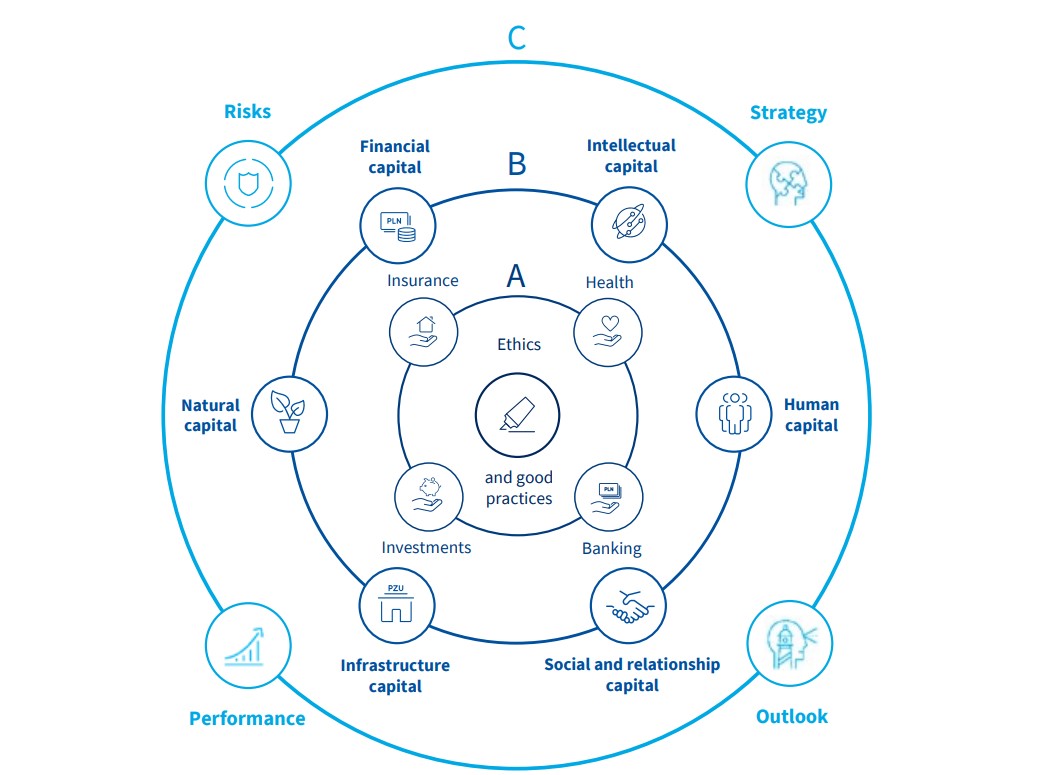Capitals - management and measurement [IIRC]
GRIs


“Our offering will be the best response to all of the most important needs most demanding individual clients and businesses currently have at every stage of their private and professional lives. We will provide them and our shareholders with significant benefits in a sustainable, sound and socially and environmentally responsible manner.”
The PZU Group’s value creation model refers to the international “IIRC” guidelines of the International Integrated Reporting Council1. They define the approach to reporting, combining material information pertaining to an organization’s strategy, approach to management, performance and future prospects in a way that reflects the financial, social and environmental context of an organization’s operations. All these aspects should refer to value creation over time with the use of available capital, i.e. the resources that the organization can access and use to create value.
A - Business
Business activity, with insurance as the key element, is at the core of the PZU Group’s value creation model. The offering is supplemented by health, banking, investment and pension products. The PZU Group is trusted by 22 million clients in five European countries, including 16 million Polish residents who hold insurance policies marked with the PZU brand. Detailed information on the activities of the PZU Group is presented in the Management Board Activity Report.
PZU Group – key areas of activity (A)

B - Various types of capital
Measurement of the efficiency of this type of capital is based predominantly on the actual reduction of and compensation for CO2 emissions, the value of funds involved in activities supporting the climate and energy transition and the percentage of procurement processes in which the ESG criteria were taken into account.
In the PZU Group, various types of capital are broken down in accordance with the IIRC classification: financial, intellectual, human, social and relational, infrastructural, and natural. The approach to managing and measuring the effectiveness of each form of capital is described below.
- Financial capital
This category includes financial resources held by the PZU Group, obtained from external sources (clients, shareholders, bondholders) and internal sources (profits generated on the Group’s business operations).
Performance management pertaining to this type of capital includes in particular activities related to:
- maintaining financial security and stability;
- ensuring funds for the development and pursuit of the strategy;
- operational and cost effectiveness.
Measurement of the effectiveness of this type of capital is based chiefly on an analysis of revenue, profitability, financial costs and the level of dividend payout from profit.
- Intellectual capital
As regards intellectual capital, of key significance to the PZU Group are the intangible resources of the whole organization and distinct employees in the form of knowledge, experience, research, development and pursuit of a culture of innovation.
Performance management pertaining to this type of capital includes in particular activities related to:
- developing CRM systems, tools for remote sales and contacts with clients;
- personalizing the product offering;
- building product ecosystems;
- integrated approach to distribution channels (omnichannel approach);
- implementation of Group standards and regulations;
- building an environment favorable to innovation.
Measurement of the effectiveness of this type of capital is based chiefly on client satisfaction surveys, analysis of the progress of work in the deployment of modern technologies (within the service and sales layers), cost analysis and evaluation of the outcomes of cooperation with startups and accelerators.
- Human capital
This type of capital is made up of employees, agents and business partners of the PZU Group. It involves matters related to creating a friendly workplace, caring for safety, building relationships based on honesty, respect and dialogue, supporting diversity, managing talents and retaining key employees.
Performance management pertaining to this type of capital includes in particular activities related to:
- diversity and respect for human rights;
- ensuring safe working conditions;
- development and training;
- hiring and retaining key employees;
- ensuring a healthy work-life balance for staff;
- ensuring conditions for an honest dialog with trade unions;
- shaping ethical attitudes.
Measurement of the effectiveness of this type of capital is based chiefly on quantifying employee commitment and satisfaction.
- Social and relational capital
This type of capital is made up of shared norms, values and behaviors that build long-term and lasting relationships with stakeholders. These are aspects related to client loyalty, brand perception and preventive, sponsoring and social activities.
Performance management pertaining to this type of capital includes in particular activities related to:
- setting standards for cooperation with suppliers and business partners;
- deploying systems to improve customer service;
- approach to recruiting and supporting agents;
- promoting a healthy lifestyle;
- disease prevention;
- accident prevention;
- providing support to local communities;
- supporting activities aimed at promoting sports, culture and art.
Measurement of the effectiveness of this type of capital is largely based on client satisfaction surveys, analyzing the outcomes of preventive and sponsoring campaigns, social campaigns and socially beneficial projects, and the use of funds allocated to activities pursued by foundations.
- Infrastructural capital
This type of capital is made up of the largest distribution and service network in Poland, in particular: branches, outlets, agents and business partners, the claims handling network, and electronic distribution channels. It also includes one of the largest corporate PZU Data Warehouses in Central and Eastern Europe as well as IT tools and systems that enable information flow both within and without the PZU Group. As a result, PZU Group clients enjoy easy and convenient access to financial products and services.
Performance management pertaining to this type of capital includes in particular activities related to:
- growth of agency structures;
- organization of work in branches;
- growth and transformation of facilities in the health area;
- standardization of structures and positions;
- development of electronic distribution channels for financial products and services;
- digitization of processes within the PZU Group.
Measurement of the effectiveness of this type of capital is based chiefly on the outcomes of satisfaction surveys, cost effectiveness and the pursuit of strategic objectives in the area of sales and aftersales service and distribution channels.
- Natural capital
This is primarily the PZU Group's direct and indirect impact on the environment. It also includes renewable and non-renewable natural resources that the PZU Group uses in its operations.
Performance management pertaining to this type of capital includes in particular activities related to:
- minimizing the environmental footprint, reducing own and indirect CO2 emissions;
- shaping the investment policy;
- building climate awareness among employees, clients and partners;
- involvement in the climate and energy transition;
- implementation of ESG factors into operations;
- development of products for entities supporting low-emission technologies.
PZU Group – various types of capital (B)

C – Corporate governance
The overriding element in the PZU Group’s value creation model is its corporate governance, which defines governance and supervision standards for the conducted business activity and strategic measures pursued by the PZU Group. The key processes are identified within the existing organizational structures that are critical for the outcomes generated by the distinct types of capital. Among the most significant of these are: risk management and development strategy. These two aspects determine the value of the company in the future as well as its impact on its surroundings and stakeholder relations.
PZU Group – corporate governance (C)

